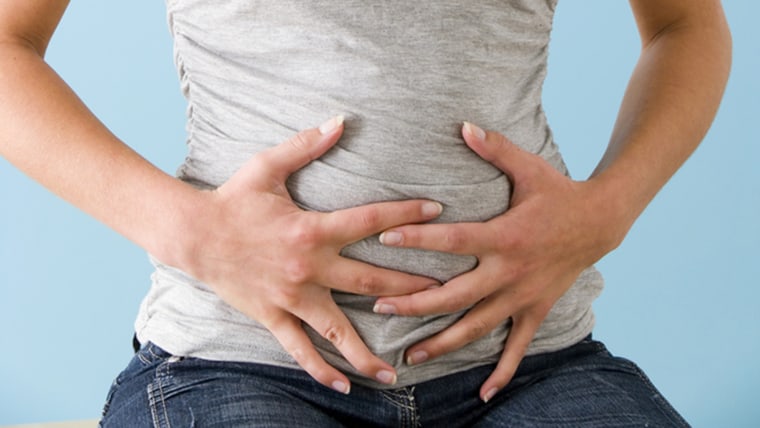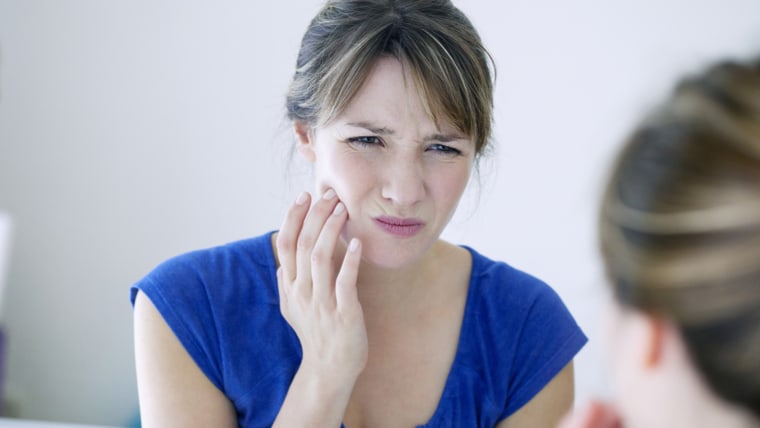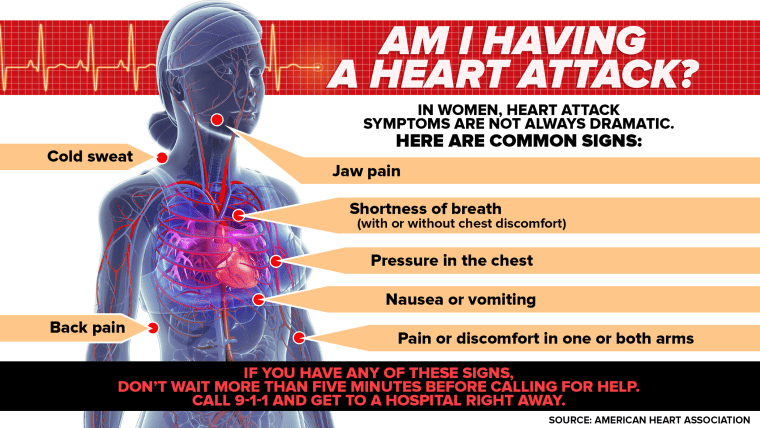Turning 40 brings so many positives, but it's also decade when we start experiencing body changes and new aches and pains. Though good health and staying fit are important to many women, we often don't pay enough attention to these changes.
“Women are indeed attuned to their health, but women are also very busy and may dismiss pain because they simply don’t have time for it,” says internist Dr. Debra DeJoseph, medical director of The Women's Health Institute at University Hospitals Case Medical Center in Cleveland.
The good news: Most changes are nothing to worry about.
But, some do signal a problem that should be treated or may even need immediate medical attention. Here are 4 symptoms women should never ignore.

1. Belly bloat
Most likely: A carb trigger, constipation, irritable bowel syndrome
Worst-case scenario: Ovarian cancer
What woman hasn't felt too full in the belly? Belly bloat is usually triggered by carbohydrates (generally those highly processed and poorly digested carbs), constipation, irritable bowel syndrome, a wheat and gluten intolerance called celiac disease, or simply too much belly fat.
But don’t self-diagnose, especially if your belly woes are affecting your quality of life or if you are just simply concerned, says DeJoseph.
In some cases, that bloated feeling is a symptom of ovarian cancer. “With ovarian cancer symptoms can be vague and there’s no reliable screening for it,” says DeJoseph. Indeed, most women diagnosed with ovarian cancer present with advanced disease, leading to a lower overall survival.
When to act: If you're experiencing abdominal or pelvic discomfort, persistent bloating or stomach pain, difficulty eating or feeling full quickly, changes in bowel movements and fatigue and back pain.
“All of these symptoms can easily be attributed to something else, and every woman seems to have at least one of these symptoms on occasion, but it’s also important to make sure these symptoms are related to something more benign than ovarian cancer, so see your doctor,” says DeJoseph.

2. Jaw pain
Most likely: A tooth or gum infection, TMJ
Worst-case scenario: Heart attack
If jaw pain is the only symptom you're experiencing, it may be because of a gum or tooth infection or a condition called temporomandibular joint (TMJ) dysfunction, explains general dentist Dr. Thomas Snyder of Cleveland. Or it could be caused by moving your jaw awkwardly or crunching down on a hard candy. If the pain lingers for more than a few days or becomes worse, see your dentist or your doctor as soon as you can, says Snyder.
However, in some cases, jaw pain can signal a heart attack, especially in women, says cardiologist Dr. Nieca Goldberg, director of NYU Langone’s Joan H. Tisch Center for Women’s Health. In that case, there's no time to waste.
When to act: Common heart attack symptoms include: chest pain or discomfort for both men and women, but women are more likely to have less typical symptoms such as shortness of breath, nausea or vomiting, as well as back or jaw pain, according to the American Heart Association.
Also, many women report that symptoms can be fleeting, and sometimes occur over the course of days, even weeks, says Goldberg.

Get immediate medical help; call 911.
You're at higher risk of a heart attack by virtue of your age, smoking history, family history, and having other risk factors like high blood pressure, high cholesterol, and diabetes.
“Women need to know their risk factors, change those factors that they can like quitting smoking,” says Goldberg. "But most of all they need to know that heart attacks can happen to them and be aware of the symptoms that may be more likely to happen to women.”
3. Feeling fatigued
Most likely: Getting too little sleep
Worst-case scenario: Sleep apnea, insomnia
Adults ages 26 to 54 need an average of seven to nine hours of sleep a night, according to the National Sleep Foundation. Many Americans don't get enough rest, but women seem to have more difficulty falling asleep and then staying asleep.
We can blame some of the fractured sleep on our hormones. “Sometimes, sleep problems can result from hormonal changes during menstruation, pregnancy and especially around perimenopause and menopause when estrogen levels decline,” explains sleep medicine specialist Dr. Ilene Rosen, a member of the board of directors for the American Academy of Sleep Medicine.
Obstructive sleep apnea, a more serious sleep problem, occurs when you experience interrupted breathing during sleep due to a closing of the upper airway.
Prior to perimenopause and menopause, higher levels of estrogen and progesterone are protective and help maintain this upper airway.
“But once these hormones start fluctuating or drop to very low levels, we see higher incidences of sleep apnea in women,” says Rosen, associate professor of clinical medicine at the Perelman School of Medicine, University of Pennsylvania.
When left untreated, sleep apnea may cause high blood pressure, heart disease, stroke, depression, car accidents and other problems.
Risk factors include a smaller jaw (common in women), the use of certain medications, obesity and even alcohol.
When to act: Although sleepless nights aren't uncommon —especially if stress has piled on — talk to your doctor if you're concerned and especially if poor sleep lasts longer than a few weeks.
“Sometimes, it’s as easy as explaining that drinking a glass of wine before bedtime can disrupt sleep,” says Rosen, adding that other lifestyle changes and non-medical approaches like relaxation training often help.
Other treatments include prescription medication and treating underlying issues like chronic pain or depression.
4. A new skin growth
Most likely: Benign skin lesion
Worst-case scenario: Skin cancer
If you baked in the sun when you were younger, chances are good your skin is now paying the price in terms of slight wrinkles and strange looking brown spots on sun-exposed areas.
Skin tags —little protuberances hanging off your neck and other body parts —and seborrheic keratosis —those ugly black or brown spots that look like warts —are common as we age.
Most skin changes are benign, but if they're cosmetically unappealing or irritated, they can be removed, says dermatologist Dr. Sheetal Mehta of Rush University Medical Center in Chicago.
However, by the time you hit your 40s, all those years of sun exposure can lead to higher incidences of skin cancer, the most deadly of which is melanoma.
Melanoma is also one of the most common cancers in the under-30 crowd, especially young women.
When to act: Although most moles are benign, those that worry doctors are the ones that look different than other moles already on your body, or those that develop after you’re about 20 years of age, according to experts at the Cleveland Clinic.
Also, be aware of basal cell skin cancers, which are caused by too much sun exposure. These cancers are generally shiny, pink or red, and can resemble an open sore or scar.
“I can’t emphasize enough how important it is for women to check their skin themselves and to talk to their doctors or dermatologists about getting an annual skin check,” says Mehta. “Like other medical problems, skin cancers that are caught early are the easiest to treat.”
This story was originally published in 2016